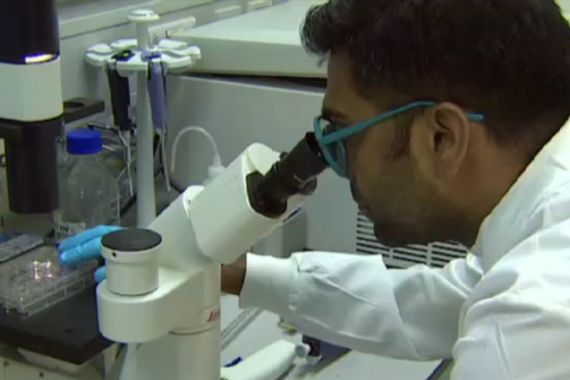Japan approves landmark stem cell trials
Government has given the green light to world’s first clinical trials using stem cells harvested from patients.

Japan’s government has given its approval to the world’s first clinical trials using stem cells harvested from a patient’s own body.
Health Minister Norihisa Tamura signed off on Friday on a proposal by two research institutes that will allow them to begin tests aimed at treating age-related macular degeneration (AMD), a common medical condition that causes blindness in older people, using “induced Pluripotent Stem (iPS) cells”.
Keep reading
list of 4 itemsWoman, seeking loan, wheels corpse into Brazilian bank
UK set to ban tobacco sales for a ‘smoke-free’ generation. Will it work?
Poland lawmakers take steps towards liberalising abortion laws
Stem cell research is a pioneering field that may offer a cure for conditions that are currently incurable, and scientists hope these clinical trials on a treatment for AMD may offer hope to millions of people robbed of their sight.
The tests will be jointly conducted by the Riken Center for Developmental Biology and the Institute of Biomedical Research and Innovation (IBRI) Hospital in Japan.
Riken will harvest stem cells, using skin cells taken from patients, a spokesman said.
The trial treatment will attempt to create retinal cells that can be transplanted into the eyes of six patients suffering from AMD, replacing the damaged part of the eye.
The transplant may be conducted as early as the middle of next year at the IBRI Hospital, he said.
AMD, a condition that is incurable at present, affects mostly middle-aged and older people and can lead to blindness. It afflicts around 700,000 people in Japan alone.
Groundbreaking work
Stem cells are infant cells that can develop into any part of the body.
Until the discovery of iPS cells several years ago, the only way to obtain stem cells was to harvest them from human embryos.
Groundbreaking work done in 2006 by Shinya Yamanaka at Kyoto University, a Nobel Laureate in medicine last year, succeeded in generating stem cells from adult skin tissue.
Like embryonic stem cells, iPS cells are also capable of developing into any cell in the body, but crucially their source material is readily available.
The question of how much freedom scientists should be allowed to carry out research on embryonic stem cells is considered one of the great ethical issues of our time.
The research is controversial because it requires the destruction of the embryo, a process that religious conservatives, among others, oppose.
Earlier this month on July 16, the national assembly of France had voted to a lift a ban on embryonic stem cell research.
And in May, scientists in the United Stated had recovered stem cells from cloned human embryos in a breakthrough that could lead to new treatments for such illnesses as Parkinson’s disease and diabetes.